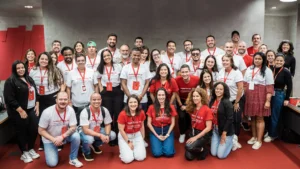Much has been said about the future of work – what it will look like and what
will be at risk. Little is said about how to shape it, so that it can exist
a win-win perspective.
Exploring only the bias of what will be at risk seems like resistance to
changes in the world of work – resistance that is completely futile in times of
pandemic, since it was precisely our ability to quickly change the
way we work that helped us navigate the crisis.
We need to increasingly explore the paths that will allow us to achieve this
win-win perspective – beneficial for workers, for companies
and for society - whether for the changes that have already arrived or for those
that are yet to come.
In 2019, the UN published the Centenary Declaration for the Future of Work,
recognizing that the world of work is undergoing profound change in
reason for technological innovations, demographic fluctuations, changes
climate and globalization. Added to this are changes in the way
work, imposed by the pandemic itself, which began in 2020.
In any case, the focus that the Declaration gives on the
importance of placing human beings at the center of the discussion about the future
of work and what this represents as a pillar of development
sustainable way to put an end to poverty, inequalities and injustices that still
surround work relations, despite the undeniable progress achieved until
here.
Guarantee decent conditions for workers involved in new forms of employment
work, invest in continuous learning to qualify employees
workers and have a comprehensive and sustainable social protection mechanism
These are appeals brought by the UN and which I highlight here as extremely important.
These are foundations that have the potential to reduce historical inequalities,
inserting young people into job market, generating opportunities, ensuring
income and rescuing the human dignity of thousands and thousands of people.
But these are foundations that need to be created and cared for from the perspective of
future of work and new ways of working. If we cling to
existing mechanisms, we will no longer place the human being at the center and
consider the changes that have occurred, as well as their resulting impacts on
our lives and current way of working, and we will not contribute to the
desired inclusion of more people in the world of work.
The teacher and author Orly Lobel, specialist in innovative policies,
behavioral law and economics, proposes expanding certain protections
basic needs for all workers and that protections are created in response to new
business models, decoupling social welfare programs from employment.
Public policies along this path proposed by Lobel have the catalytic power of
create these foundations to achieve a win-win perspective; and they are
urgent, according to the UN.
It is in the hands of society, companies, workers and public authorities
discuss and implement them in time.
Tatiane Neves Alves is legal coordinator at iFood. Lawyer graduated from the Faculty of Law
from São Bernardo do Campo and postgraduate degree in Business Law from Insper,
has corporate experience in technology companies focused on
Advisory, Contracts and Regulatory.
Read more:


